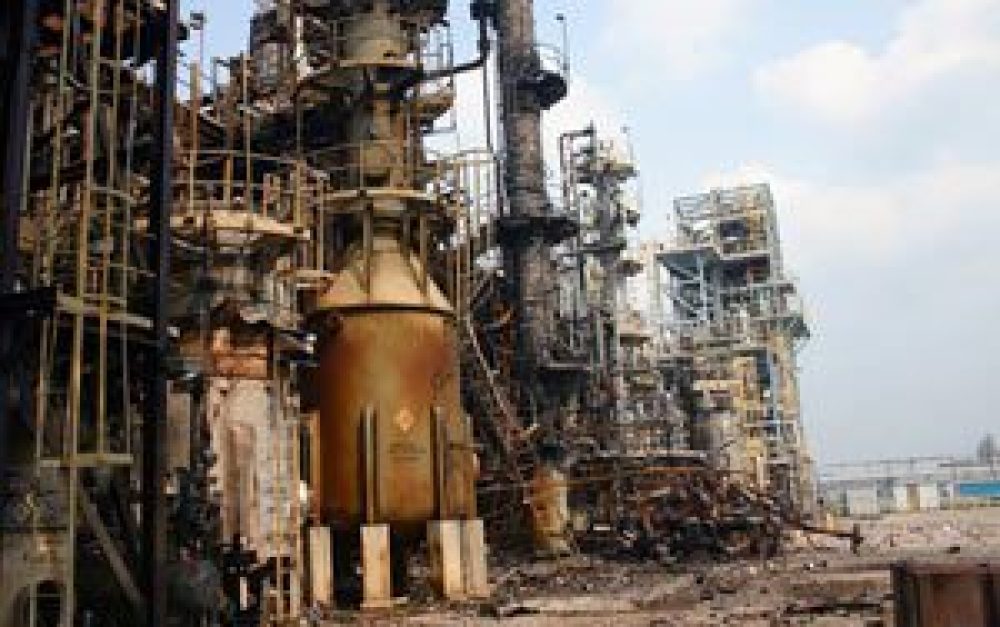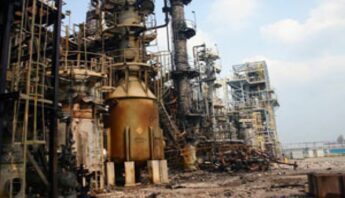Institute, WV – This morning, March 18, in a “hastily called” court hearing, “Bayer CropScience lawyer Al Emch informed Chief U.S. District Judge Joseph R. Goodwin that the company has decided not to resume production of the deadly chemical methyl isocyanate [MIC] at its Institute plant,” reports the Charleston Gazette. It was an MIC explosion that caused the 1984 Bhopal pesticide plant disaster.
A 2008 explosion at Bayer's West Virginia plant, killing two workers and coming perilously close to causing a much more disastrous explosion of the MIC storage unit, was only the latest in accidents at "America's Bhopal". It triggered fresh investigation and a federal finding of operator error and violation of safety rules. Just before the report was issued, Bayer said it was decommissioning the MIC unit. Subsequently the company said it would restart the unit but reduce storage of MIC at the plant.
Bayer's surprise announcement today means the company won’t be able to produce the pesticide aldicarb (brand name Temik) for the 2012 growing season. Citing increased evidence of aldicarb's health hazards for children, U.S. EPA finally decided to ban aldicarb in 2010 — 20 years after it caused the worst outbreak of pesticide poisoning in North America— phasing it out for cotton and other crops over five years. Uses on citrus and potatoes are prohibited after 2011. While saying it disagreed about the evidence, Bayer had promised to stop producing the highly toxic insecticide by 2015 in all world markets.
“‘I am heartened with Bayer’s decision [today] and believe that we are safer as a result,’ said Maya Nye, a leader of the local group People Concerned About MIC, and one of 16 residents who had sued to block Bayer from restarting the unit.” The Huffington Post notes: “That ends the key part of the latest lawsuit in a nearly three-decade battle. Claims for property damages and medical monitoring remain, and Judge Goodwin has scheduled a hearing Monday on the remaining issues.”
Working with People Concerned About MIC, the International Campaign for Justice in Bhopal had flown in a well-known Bhopal disaster survivor, Sanjay Verma, to testify at Monday's hearing. "Bayer's announcement is not only the victory for residents of a tiny West Virginia town called Institute," Verma told PAN today, "It is a victory for the world."
Responding to the resident’s suit in February, Goodwin ordered Bayer not to restart MIC production for a month. A hearing was scheduled to begin Monday, May 21, to consider the resident’s request that production be blocked permanently. Emch told the judge today that Bayers preemptive move was precipitated by the company's determination "that it was not beginning the restart while there was an ongoing or open inspection going on by a government regulatory agency.”
Congresswoman Shelley Moore Capito, R-WV, expressed dismay about the decision, repeating Bayer’s message that it as “another example of government red tape and slow-decision making inhibiting business’s ability to operate and keep people at work."
One might speculate, rather, that the “series of ‘high-level meetings’ at [Bayer’s] corporate headquarters in Germany Tuesday, Wednesday and Thursday” may have been colored by the world’s focus on burning nuclear reactors in Japan, a context in which defense of inherently hazardous pesticide production in a poor, mostly black neighborhood in West Virginia might be seen as imprudent, if not outrageous.







